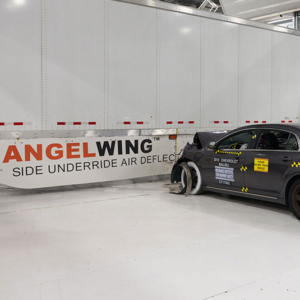ATA seeks guidance on missing underride guard labels
From Transport Topics. The trucking industry is asking federal regulators for clarity about potential enforcement issues surrounding a new rule for annual inspection of rear underride guards on trailers. Specifically, American Trucking Associations in a March 25 letter asked what would happen if labels that must be attached to trailers to certify that a guard…

From Transport Topics.
The trucking industry is asking federal regulators for clarity about potential enforcement issues surrounding a new rule for annual inspection of rear underride guards on trailers.
Specifically, American Trucking Associations in a March 25 letter asked what would happen if labels that must be attached to trailers to certify that a guard complies with placement and strength requirements are lost, damaged or unreadable. The law mandating the inspections and labels took effect in December.
“While ATA supports adding rear underride guards to the list of annually inspected items, there is a fundamental disconnect in which a rear underride guard can pass annual inspection but fail a roadside inspection due to the labeling requirement,” Kevin Grove, director of ATA safety and technology policy, wrote in the letter, sent to FMCSA Associate Administrator Larry Minor. “ATA does not believe that the presence of a manufacturers label will — in any case — have an impact on safety.”
Grove’s letter noted that at ATA’s recent Technology & Maintenance Council Annual Meeting, fleets expressed concern that the final rule did not address a petition on the general labeling requirement filed by the Commercial Vehicle Safety Alliance.
“During the Fleet Operators’ Forum on Wednesday, March 9, 2022, fleets reiterated that they are not able to acquire replacements for damaged or missing labels, and were frustrated over whether this issue could lead to violations that are out of their control,” Grove wrote.
In its November rulemaking, FMCSA said CVSA’s label question was a “separate issue” to be dealt with in the future.
See the complete article online at Transport Topics.
